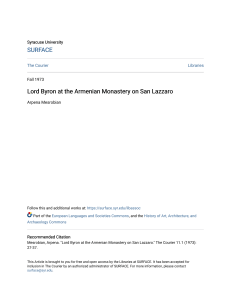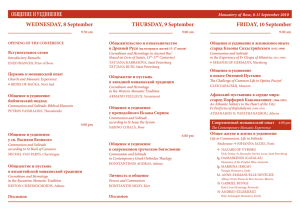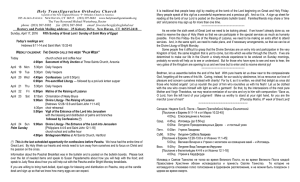հայկական ճարտարապետութիին
advertisement

ՀԱՅԿԱԿԱՆ ՃԱՐՏԱՐԱՊԵՏՈՒԹԻԻՆ ՀԱՅԿԱՆՈՒՇ ՄԵԼՔՈՆՅԱՆ In the realm of Armenian art, architecture takes pride of place. It was the first of the arts of Armenia to be seriously studied, and to this day Armenian architecture receives more scholarly attention than all of the other arts combined. Armenian architecture is an architectural style developed over the last 4,500 years of human habitation in the Armenian Highland. As it originates in an earthquake-prone region, tends to be built with this hazard in mind. Armenian buildings tend to be rather low-slung and thick-walled in design. Armenians never used wood or brick when building large structures. Only in outlying regions of Armenia, where tufa is not readily available, was another stone substituted. In many respects tufa is an ideal material for construction because it is light of weight, easy to sculpt, and has the property of becoming harder and more durable with exposure to air and the passage of time. Ուրարտու - Էրեբունի Urartian architecture was noted for its use of large, carefully-cut stones, used as foundations for wood or mud brick buildings, usually constructed in a compact manner suggest a high degree of planning and craftsmanship. Erebuni, 781 BC. Հեթանոսութիւն The temple of Garni is the only pagan monument left in Armenia, as many others where destroyed or converted to Christian places of worship under Tiridates III. Քրիստոնեութիւն The first Armenian churches were built between the 4th and 7th century, beginning when Armenia converted to Christianity, and ending with the Arab invasion of Armenia. By the time of the Arab invasion, most of what we now know as classical Armenian architecture had formed. Etchmiadzin Cathedral, 485, restored in the VIIth and XVIIth centuries. St. Gayané, Etchmiadzin, 630-641 Ptghni, Abovyan, Armenia, VIth-VIIth century. Zvart'nots', near etchmiadzin, 641-653. Բագրատունեանց Հայաստան From the 9th to 11th century, Armenian architecture underwent a revival under the patronage of the Bagratid Dynasty with a great deal of building done in the area of Lake Van. This included both traditional styles and new innovations. Ornately carved Armenian Khachkars developed during this time. This period was ended by the Seljuk invasion. Talin Cathedral, VIIth century. Bjni, St. Sargis, VIIth century. Island of Aght'amar, Lake Van, Church of the Holy Cross, 915-921. Lake Sevan, Monastery of Holy Apostles and Mother of God, IXth century. Մեր գեղեցկութիւնը աշխարհին ցոյց տալու համար է ստեղծուել Անին... Ani – some call it the City of 1001 Churches, others the City of Forty Gates. Yet no one has called it home for more than three centuries. Ani is a ruined and uninhabited medieval Armenian city-site situated in the Western Armenian province of Kars, beside the border with Armenia. It stood on various trade routes and its many religious buildings, palaces, and fortifications were amongst the most technically and artistically advanced structures in the world. In 1064 a large Seljuk-Turkish army, attacked Ani and after a siege of 25 days they captured the city and slaughtered its population. Կիլիկիա From the 12th to 14th century Armenian monasteries were built. Monasteries were institutes of learning, and much of medieval Armenian literature was written in this time period. The invasion of Timurlane and the destruction of Cilician Armenia ended architectural progression from another 250 years. Amberd fortress, XIth-XIIIth centuries. Paperon, Cilicia, fortress, XIIth century. Sanahin, bridge, XIIth century. Tatev Monastery, IX-XIth centuries. Goshavank Monastery, XIIth-XIIIth centuries. Kech'aris Monastery, XIIth century Noravank Monastery, Church of Mother of God, 1339. Haghartsin Monastery, XIth-XIIIth centuries. Поездив по свету, смею утверждать, что ни в одной стране мира, даже в Италии, не сохранилось, а может быть, и не было построено столько аннесредневековых, то есть первого тысячелетия, великолепных сооружений: церквей, гавитов, книгохранилищ, монастырских комплексов, крепостей. И это несмотря на почти не прекращавшиеся войны и землетрясения. Практически в каждом селе или городе вы встретите сооружение не старше XIII века, а если повезет, то и VII-го, или какой нибудь диковинный кирпичный арочный мост, которому будет как минимум несколько веков. Вся Армения это музей великолепного строительного мастерства под открытым небом. Contemporary examples of Armenian Architecture The Holy Mother of God Cathedral (1940) at theCatholicossate of the Great House of Cilicia in Antelias, Lebanon St. Gregory The Illuminator Armenian Apostolic Church (1928) in Cairo,Egypt Holy Cross Church (Sourp Nshan) in downtown Beirut, Lebanon Saint Paul Armenian Church (1979) in Fresno, California Saint Mary Armenian Apostolic Church (1983) in Toronto, Canada Saint Sarkis Church(1970) in Tehran, Iran The Saint Gregory the Illuminator Cathedral (2001), Yerevan, Armenia the largest Armenian church in the world St Gregory Armenian Church in Springfield, MA The Saint Gregory the Illuminator Armenian Catholic Church (2001) in Glendale, CA St. Kevork Armenian Church, Aleppo, Syria The Patriarchate of Constantinople St James church in the Armenian sector, Jerusalem Khor Virap, Monastery of St. Gregory's pit, at the foot of Mt. Ararat, XVIIth century.







